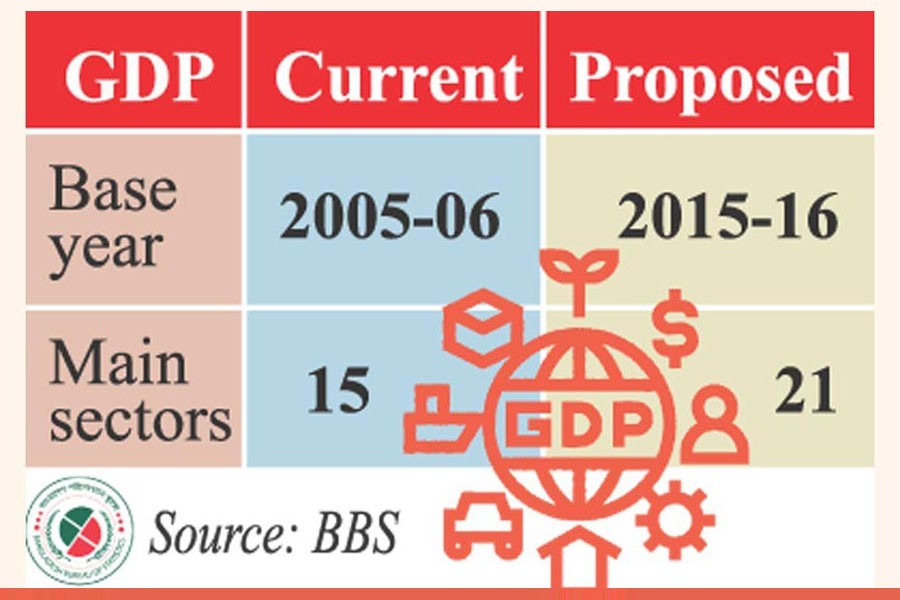
Published :
Updated :

The local statistical agency has said it will adopt a new base year for calculating the Gross Domestic Product (GDP) effective from July 2020 and it is expected to raise the size of the economy by at least 10 per cent.
Under the rebasing procedure, the fiscal year 2015-16 (FY '16) will be the new base year replacing the existing FY '06.
Statistical agencies across the globe usually adopt the base year actually including new products and services. So, the size of the economy changes.
Bangladesh last did it in 2013 by replacing the FY 1995-96 as the base year.
On the last occasion the economy had expanded by around 12 per cent.
"We've decided in principle to calculate GDP by using a new base year from July 2020," said Abul Kalam Azad, director of the national accounting wing (NAW) under the Bangladesh Bureau of Statistics (BBS).
He also said in the event of the new base year the latest system of national accounting (SNA)-2008 would be used.
The SNA-2008 and similar others prepared by the UN Statistical Council are followed by all economies.
He said the new base year would give a more accurate picture of the economy's structure and per capita income will also increase further.
The bureau was also analysing data "linking the sustainable development goal (SDG) indicators," he said.
"We are expecting that the GDP size might increase by 10 to 12 per cent with appropriation of the new baseline", he added.
People familiar with the development at the BBS also told the FE that they had been conducting many surveys targeting the rebasing.
"Some surveys have already been done and some others in the fields like manufacturing, agriculture and e-commerce are going on to this end," joint director at NAW Ziauddin Ahmed said.
The surveys would help calculate contributions of many untapped sectors which needed to be included in the economy, he added.
He said the BBS took a project titled 'Modernisation of National Account' in 2017 aiming to adopt the new baseline. The project would end in June 2020.
He said presently they were measuring the country's economic size taking into account 15 sectors. The sectors would be expanded to 21 with adoption of the new baseline.
Water would be a separate sector which was attached to Electricity and Gas earlier, he said.
He said Real Estate and Business Activities sector would be split into two separate sectors -- Professional, Scientific & Technical Activities and Administrative & Support Service Activities.
He said the bureau started working to measure the GDP of FY 17, FY '18 and FY '19 based on the FY '16 baseline.
Experts and economists familiar with such development in the country told the FE that the move to adopt the new base year was okay as the economy changes over the years.
Dr Sajjad Zohir, executive director of Economic Research Group (ERG), said adopting the new baseline meant more accurate reading of 'consumption bundles.'
He expected that the CPI (consumer price index) and inflation should also be measured on the basis of the new base year.
He said: "Weight or share of rice in the consumption basket has been declining over the years."
"Updating the baseline will give a more precise figure of the inflation rate as it could deliver latest status of rice's share in the consumer goods basket," he said. Dr Zaid Bakht, economist and chairman of the state-run Agrani Bank Ltd, said: "It is a step in the right direction, as the closer the base year is to the current year, the better the results are".
He said updating the base year through revising the GDP estimation was essential for different reasons, including newer economic activities, progressive expansion and downsizing of different industries and economic sectors over the years.
Commercial service of the ridesharing companies, many untapped online delivery services like food and parcels, should be included in it to find more precise data, he said.
The BBS should also work on trade through social networks like Facebook, instagram, which expanded "beyond our imagination."
He said it was positive that the country was adopting a new baseline just in seven years as earlier it took 10-12 years.
"But it would be better if a new baseline is appropriated in every five years", he added.
Dr Khandoker Golam Moazzem, director (research) at the Centre for Policy Dialogue (CPD), said inclusion of various newer sectors could help measure the GDP more accurately as the BBS is going to adopt a new base year.
"But revenue generation from newer sectors is also important in line with the increase in the size of the GDP," he said.
"With adoption of the new base year, it is sure that the size of the GDP will enhance further," he said.
But if the government couldn't generate more revenue keeping pace with the change, the gap in the tax to GDP ratio might increase further.
In FY17, the ratio of tax to GDP in Bangladesh was 9.1 per cent, the second lowest in South Asia. The country's GDP at the current price is now US$ 274 billion and per capita income is $ 1,751.
tonmoy.wardad@gmail.com


 For all latest news, follow The Financial Express Google News channel.
For all latest news, follow The Financial Express Google News channel.